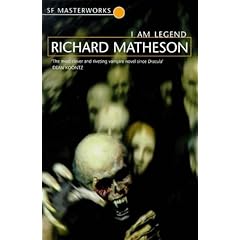 I was as surprised by Richard Matheson's I Am Legend as I was over John Wyndham's Day of the Triffids and Ray Bradbury's Farenheit 451 - these three great moments in SF lore aren't huge opus's, they aren't epic, they don't flourish with golden language. They are well written, tight prosed, introspective stories of potential horror (potential of course if you can suspend disbelief).
I was as surprised by Richard Matheson's I Am Legend as I was over John Wyndham's Day of the Triffids and Ray Bradbury's Farenheit 451 - these three great moments in SF lore aren't huge opus's, they aren't epic, they don't flourish with golden language. They are well written, tight prosed, introspective stories of potential horror (potential of course if you can suspend disbelief).Triffids was a discard I picked up from the library, Farenheit, I read because I'd found the film Equilibrium had interesting ideas... and Legend, I read because Will Smith is starring in it at the end of the year.
Let's get the weaknesses out the way: Matheson relies heavily upon simple body movements to show feeling, sickness, worry, anger. And much of that ends up regarding a thinned mouth or the movement of a throat (I wasn't sure if they were feeling sick or just swallowing though). Those tight thin lines that the mouths became reminded me of what my screenwriting tutor had said about making sure I don't put too many physical directions for my characters, lest they all turn into nodding-head dogs! Finally, the word palsied crops up far too often, and I still haven't checked what it really means...
Dictionary.com says:
any of a variety of atonal muscular conditions characterized by tremors of the body parts, as the hands, arms, or legs, or of the entire body.
Yeah, I thought as much! No, actually I didn't care. One of the other members of my NAW class mentioned that there was a time during the 1990s when the word preternatural had to be used, and it drove him crazy. About as crazy as the drive for, when he was in business, the use of the word paradigm. He was horrified to hear it had come back again.
Anyhoo, Dictionary.com says preternatural means:
1. out of the ordinary course of nature; exceptional or abnormal: preternatural powers.These three stories are vastly different and have led in their own way to so many other ideas and story concepts (just as George Lucas has touched everything CGI with the firey brand that begot Star Wars). But in the case of Legend in particular I see how this has related to the likes of Blade, Resident Evil, even the Channel 4 TV series Ultraviolet. The boiling down into science, baccili and germs, which comes across as very well thought out... so much so that I wonder why fewer other Vampire writers took up this mantle.
2. outside of nature; supernatural.
The obvious answer is that Legend doesn't hold any romantic notion of the Vampiric state. There's no Brad Pitt's Louis evading Tom Cruise's Lestat or some Godly references to the Queen of the Damned. Surely that offers too much hope.
Anyhoo. Short of giving away the ending, the about turn of the novel, the realisation and denoument give the book the edge that often the midway through ramblings of Robert Neville's loner loses. It's not an out and out fight to the blood and guts end, it's the inner fight of a man dealing with the fact he's the last man on Earth... and he's not alone.
No comments:
Post a Comment